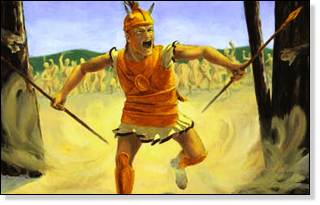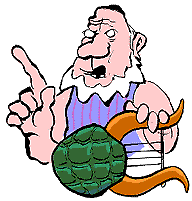Hades (2) (HAY-deez). Realm of the dead, either underground or in the far West of the world known to the early Greeks – or both. Named for the god Hades, its ruler.
 As is not surprising, the ancient Greeks did not know what to expect after death. Notions of the afterlife were various and conflicting. Some thought that great heroes lucked out by traveling to the Elysian Fields, where they could hunt and feast and socialize in pleasant company for eternity, while commoners were consigned to a lifeless and boring abode in the Fields of Asphodel. First they'd drink the waters of Lethe, which caused them to lose all memory of their former lives and thus lack anything to talk about.
As is not surprising, the ancient Greeks did not know what to expect after death. Notions of the afterlife were various and conflicting. Some thought that great heroes lucked out by traveling to the Elysian Fields, where they could hunt and feast and socialize in pleasant company for eternity, while commoners were consigned to a lifeless and boring abode in the Fields of Asphodel. First they'd drink the waters of Lethe, which caused them to lose all memory of their former lives and thus lack anything to talk about.
 In its earlier depictions, the underworld kingdom of Hades was such a dank and dark and moldering place that were it laid open to the heavens, the gods themselves would turn away in disgust.
In its earlier depictions, the underworld kingdom of Hades was such a dank and dark and moldering place that were it laid open to the heavens, the gods themselves would turn away in disgust.
|
| | Harpies (HAR-peez). Razor-clawed, smelly birds with the faces of women, who defiled the food of King Phineus of Salmydessus. The king was so grateful to the Argonauts for ridding him of these pests that he suggested a means by which Jason and his shipmates might avoid being crushed to death by the Clashing Rocks.
| |
| |











